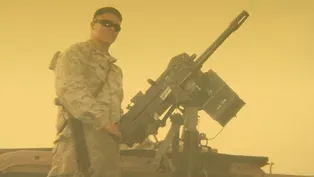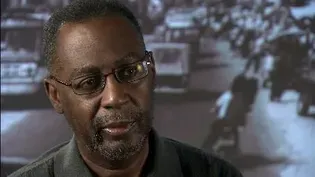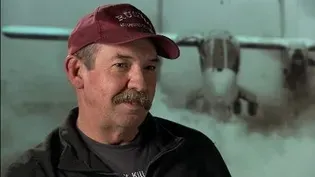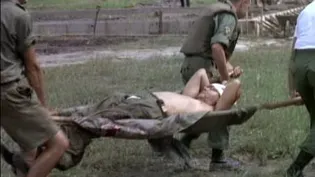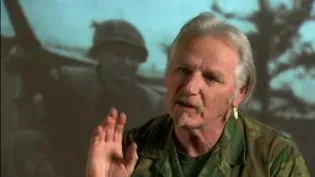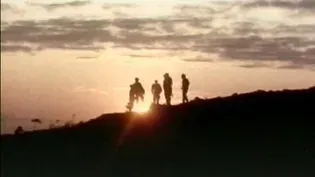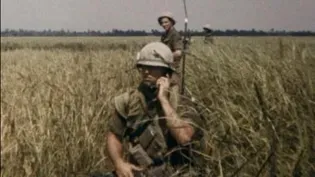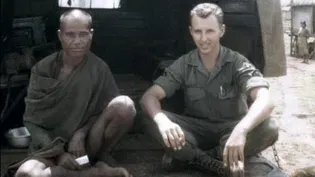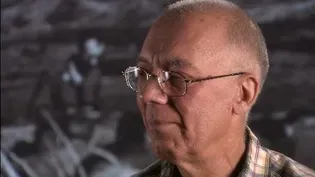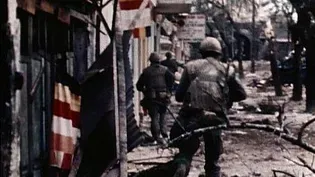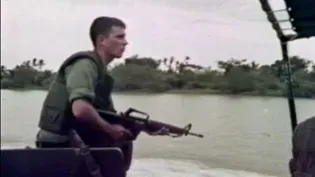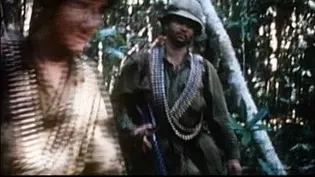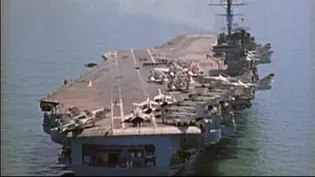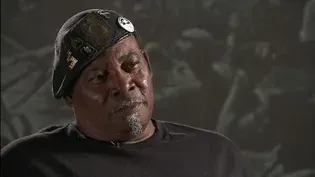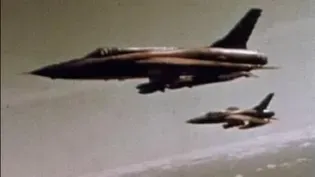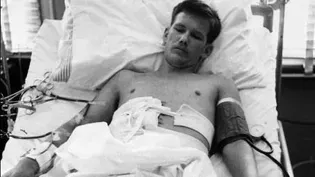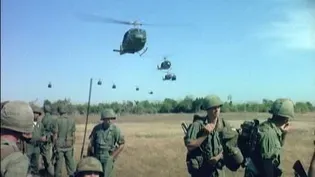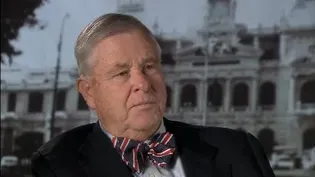
Vietnam: Escalation - Send in the Marines
Clip | 8m 7sVideo has Closed Captions
Marines describe their arrival in Vietnam and the difficulty of jungle warfare.
1965 Wisconsin Marines describe their arrival in Vietnam, the difficulty of jungle warfare and the strong bonds that came from increasing adversity. (Part 3/7)
Problems with Closed Captions? Closed Captioning Feedback
Problems with Closed Captions? Closed Captioning Feedback
Wisconsin War Stories is a local public television program presented by PBS Wisconsin
Thanks to lead gifts from Don and Roxanne Weber, Associated Bank, Ho Chunk Nation and the Lynde and Harry Bradley Foundation.

Vietnam: Escalation - Send in the Marines
Clip | 8m 7sVideo has Closed Captions
1965 Wisconsin Marines describe their arrival in Vietnam, the difficulty of jungle warfare and the strong bonds that came from increasing adversity. (Part 3/7)
Problems with Closed Captions? Closed Captioning Feedback
How to Watch Wisconsin War Stories
Wisconsin War Stories is available to stream on pbs.org and the free PBS App, available on iPhone, Apple TV, Android TV, Android smartphones, Amazon Fire TV, Amazon Fire Tablet, Roku, Samsung Smart TV, and Vizio.
[solemn music] - Roy Rogers: We were actually the first troops that went to Vietnam as combat.
March 10 of 1965.
In the middle of the night, they woke us up and said we had two hours to pack up our things and we had to be in the parade ground at 3 o'clock in the morning.
They put us in the trucks, never told us where we were going.
Took us to Pearl Harbor, put us on the troop carrier, and 15 days later, we were in Okinawa.
Then we went to Vietnam.
We went down the nets on the side of the ship.
We had all of our gear.
We got off of our landing craft; when we got on the beach, there was all kinds of women and kids there.
They had bottles of Coca-Cola for us and flowers.
It was, "Where are we?"
[chuckles] We didn't know where we were.
- John Dederich: The first full unit went ashore at Red Beach, just north of Danang, and I followed shortly after there in April.
For three or four months, all we did was expand the perimeter.
You know, and yeah, we would take a little sniper fire here and there, but it really wasn't a full-fledged combat situation when we first got there.
First, you had to find 'em before you could fight 'em.
And that's what the sweeping operations were.
That you would go through the valleys hoping to find a unit large enough.
- Richard Erck: Our motto with Recon was swift, silent, and deadly.
And I chose that over being in the regular infantry just because it was a lead outfit and I thought I would enjoy it more, and I did.
And I don't regret that decision.
I met some really hardcore soldiers, guys that knew why they were there and knew what to do.
I had that John Wayne syndrome, man.
I wanted to get out and stop 'em right there.
Fight like a man.
Didn't happen; you didn't see 'em.
You walked into traps and you were fired on by snipers that you didn't see.
And it was a completely different mindset then.
And it took us quite a while to learn to fight them, to give 'em back some of what they gave us.
- My father sent me over a 16-millimeter camera, and I hung that around my neck with a shoestring and carried it around.
And one of the things I filmed was kinda like a playacting firefight on top of one of the hills at the foxhole.
And they made believe they were shot and falling back.
And you know, this was pretty early in the time that we were over there, so it was easy to playact.
Now I see the films and it bothers me because it wasn't funny anymore after I realized what it was like.
- I mean, you know, we were with the same unit, the same people now for a year, year and a half.
These were your closest people you knew in the world.
And all of a sudden, there started to take injuries and deaths.
That was really hard.
That's why I had a great deal of anger.
And eventually, it would subside, and then you would just realize that fear and anger, neither one of those are going to help you in the situation.
Somewhere in the middle of it, you lose track of what day it is or what month it is, and you really don't care.
But you resign yourself.
And I had never thought, after maybe that six, seven months, that I was ever going to come out of that country alive.
You pretty well knew that.
- Every second, every day, every night, back to back.
Doc Nichol, he and I sat back to back many a night.
When he first came to my platoon, we didn't wanna take him.
And I told him I wasn't gonna patrol with a green corpsman, you know.
And he told me if he could whip my butt, then would I let him go?
I said, "Sure, come on," you know.
And we went around and around.
We rolled around the concertina and down the ditches.
After that little fight, I said, "Okay, Doc.
You can go with us."
You know, I gave in.
He says, he was a tough little 17-year-old punk.
He says, 'cause he always called me old man, he says, "Come on, old man, I'll kill ya!"
We were Siamese twins after that.
We stuck together.
- Four days before I was due to be sent home to the States, I volunteered to go out on a patrol.
I was singing a song, "Handyman" I think.
I was weaving back and forth, and all of a sudden, there was a big explosion.
I looked down and there was blood shooting out of my hand.
It was just like a bubbler.
And then someone was yelling, "Corpsman!"
- Of the original unit, or at least our platoon, three of us had neither, haven't been killed or wounded.
We were coming down out of the mountains, and I rounded a building and stepped on a land mine, and went 50, 60 feet in the air.
And then, you know, the right leg went one way, the left leg went the other way, and I got a little bit charred.
First thing I thought when I came back down, "Where's my rifle?"
You know, crawling for your rifle.
Moved a little bit, and then the corpsman came and stopped me.
And I had brought the unit partially into a land mine area.
But the corpsman stayed with me.
- Under fire, Doc was tough.
He was quite the guy.
When we were patching up our platoon sergeant, wrapping around his chest 'cause he had been shot in the chest and he was sitting up on a log.
And there's fire going everywhere.
And he handed me the bandage, and I saw the round hit him in the hand, and the bones came right out of the palm of his hand, and then hit the sarge, somehow got his arm.
He had his arm up there and hit his arm.
And he fell on the ground and he's holding it, and he's hollering, he's cussing and carrying on.
And I told him, "Well, I suppose you're done now, right?"
"No, I ain't done," he says, and he jumps up.
And we're trying to finish it and he's trying one-handed, and I wrapped him up and then we moved up the hill.
We tried to get everybody out of the ambush we were in.
- When I was wounded, I figured God had a reason for me to live because the Bouncing Betty that I stepped on is meant to make a wishbone out of you, but my rifle took the blunt of the force of the explosion.
They tell me they never found any of my rifle.
They couldn't put me back together like Humpty Dumpty, but... [chuckles] They did the best they could, yeah.
- I didn't think I was gonna live anyway 'cause I could look down, I could see the mess I was, and almost everything was black.
And I was kinda happy because they had morphine and then they put tourniquets on the legs, and stuff like that.
So they put me on a stretcher and this guy's running alongside of me, saying, "Can I say a few words for you, son?"
And I said, "Yeah, but hurry up!"
You know?
[laughing] I mean, I was hedging my bets at that time.
I mean, I didn't think there was any way as heck I was going to make it, and I never did figure out what he was.
- I was covered in blood, head to toe.
It wasn't mine; it was the guys that were leaking and the helicopter prop wash was blowing it down on me.
And I was the last guy off when I got back to the back area on the helicopter after getting everybody evacuated.
They said, "Oh, he's dead."
He went in the body bag.
Danang, he went to the body bag.
Danang.
I said, "Oh, my God."
You know, Doc was only shot in the hand.
And they said, "Well, he must've got hit going up to the helicopter."
Ah, yeah, I had a hard time coping with those losses.
These guys were the toughness of our outfit.
They were the best.
And I lost 'em all in one shot.
And you didn't wanna get close to 'em.
You get too tight with a guy and you lose him.
And it hurts every time, you know.
Excuse me.
Video has Closed Captions
OIF Army veteran Crystal hits the road to find her way home to an organic farm. (5m 20s)
Video has Closed Captions
Vietnam War veterans help today's veterans cope with the invisible scars of combat. (30s)
Vietnam: Draw Down - Rear Echelon
Video has Closed Captions
Veterans assigned to support jobs in the military describe life on and off duty. (7m 40s)
Vietnam: Draw Down - Hamburger Hill
Video has Closed Captions
Veterans recall the haunting memories of a battle they waged for many days. (6m 49s)
Vietnam: Draw Down - Firepower
Video has Closed Captions
Air Force veterans recount dangerous missions targeting the North Vietnamese Army. (8m 1s)
Vietnam: Draw Down - Broken Bodies
Video has Closed Captions
Wounded veterans and hospital staff describe field hospital scenes and returning home. (7m 17s)
Vietnam: Turning Point - Walking Point
Video has Closed Captions
Veterans describe the dangers and responsibilities of walking point. (6m 56s)
Vietnam: Turning Point - The Price
Video has Closed Captions
Veterans reflect on the staggering casualties in Vietnam, and how they coped. (8m 19s)
Vietnam: Turning Point - TET 1968
Video has Closed Captions
The Tet Offensive shocked both soldiers and the American public. (8m 13s)
Vietnam: Turning Point - Montagnards
Video has Closed Captions
Veterans discuss working with the Montagnards, people indigenous to Vietnam. (6m 57s)
Vietnam: Turning Point - Khe Sanh
One of the bloodiest battles of the Vietnam War took place at Khe Sanh. (7m 36s)
Vietnam: Turning Point - Hue City
Video has Closed Captions
The battle at Hue City highlighted the dire state of the Vietnam War. (6m 47s)
Vietnam: Turning Point - Brown Water Navy
Video has Closed Captions
River-based Army and Navy veterans describe facing enemy attacks and Agent Orange. (8m 12s)
Vietnam: Escalation - Send in the Marines
Video has Closed Captions
Marines describe their arrival in Vietnam and the difficulty of jungle warfare. (8m 7s)
Vietnam: Escalation - Naval Presence
Video has Closed Captions
Navy veterans explain their experiences off shore supporting Special Forces. (7m 16s)
Vietnam: Escalation - Elusive Enemy
Video has Closed Captions
Encounters with underground tunnels and their growing uncertainty in the mission. (8m 2s)
Vietnam: Escalation - Dropping Bombs
The allure, challenges and heartbreaking loss of early air combat in Vietnam. (6m 44s)
Vietnam: Escalation - All Hell Broke Loose
As missions became more dangerous, casualties rose. (8m 48s)
Vietnam: Escalation - Airmobile
Veterans of the helicopter brigades describe experiences of bravery, danger and loss. (7m 54s)
Vietnam: Escalation - Advise and Assist
Explore the early events that set the conflict and United States participation in Vietnam. (6m 6s)
Providing Support for PBS.org
Learn Moreabout PBS online sponsorshipSupport for PBS provided by:
Wisconsin War Stories is a local public television program presented by PBS Wisconsin
Thanks to lead gifts from Don and Roxanne Weber, Associated Bank, Ho Chunk Nation and the Lynde and Harry Bradley Foundation.

